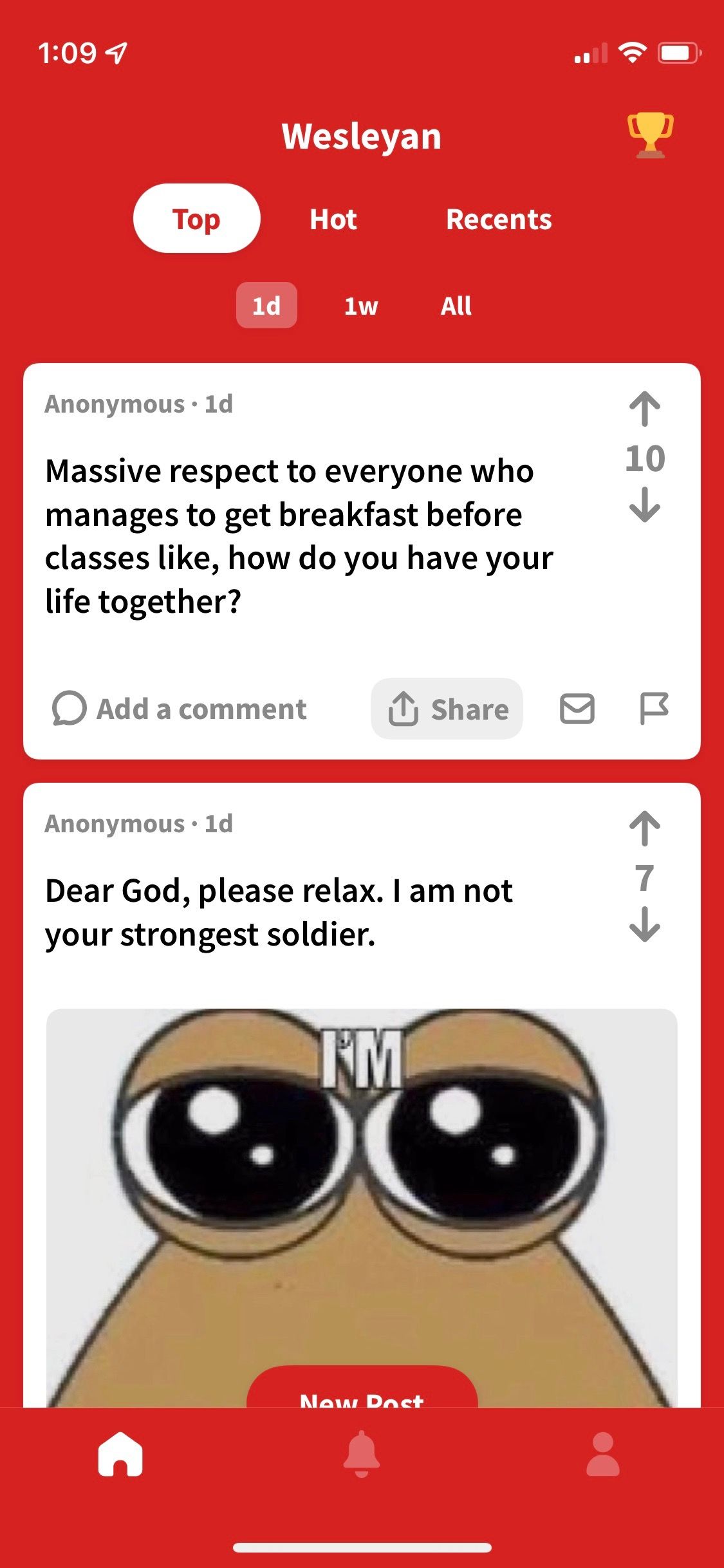
c/o Hannah Docter-Loeb, Executive Editor
Earlier this year, YikYak took Wesleyan by storm. Students took to the anonymous app to poke fun at the campus community, complain about various incidents, or just shout their feelings to the internet void. Another anonymous app has now emerged at Wesleyan: Sidechat.
Like YikYak, Sidechat enables users to post anonymously and receive upvotes (likes), downvotes (dislikes), or comments on their posts. However, Sidechat centers around the Wesleyan experience and is restricted to the University’s students.
“I would say it’s a better version of YikYak,” tabler for Sidechat Kylo Fleischer ’25 said. “It’s school-specific. Even if you’re off campus, you will see Sidechat from Wesleyan. People from the area are not able to post unless they’re a part of Wesleyan. I think the best feature is that you can include pictures, which just gives people posting more opportunity to make content.”
Sidechat is not unique to Wesleyan. It has become popular at other schools, such as Cornell University, the University of Pennsylvania, Harvard University, and Brown University. After launching the app at other schools, someone on the Sidechat team reached out to Wesleyan students to survey interest in the app.
“I got involved because Carolina [Mahedy] ’21, who was a Wesleyan alum, was gauging interest through Wesleyan students about the possibility of bringing the app here,” Chloe French ’25 said. “She basically wanted to know how social media is at Wesleyan, what the Wesleyan community looks like, if I use social media, which social media [platforms] do I use.”
After their conversation, French was asked to spearhead a tabling campaign and recruit other students to promote the app on campus. French received a referral bonus of $10 for getting other students involved, and students who tabled received $20 per hour. French said this was an opportunity to make some extra cash while having fun.
“I was totally down to take that on and make money,” French said. “Especially coming from a low-income family, I could use the cash. It was super easy and honestly fun because I got to sit with my friends for an hour and get paid and eat donuts.”
French was able to recruit many other Wesleyan students to help spread the word about Sidechat. They found that tabling was advantageous in encouraging students to sign up for the app.
“It had some steam…during those days [we were tabling],” Fleischer said. “It was pretty successful. It was taking off. There were Sidechat posts with up to 100 upvotes.”
However, Sidechat encountered some pushback. French noted that many students made jokes about it being a pyramid scheme. Students were also worried about privacy.
“A lot of people were concerned about logging in with Wesleyan ID, if Wesleyan could see that from their side because it’s your email, [or] if you could get in trouble for something like that,” French said.
Some said the app has died off since their tabling efforts.
“I would say that the donut program was probably effective but set them up to be a joke,” Milly Berman ’24 wrote in a message to The Argus. “I downloaded the app for a couple days and it wasn’t that funny so I deleted it.”
Berman also pointed to the app’s redundancy relative to YikYak, which she has her own reservations about.
“It’s totally irrelevant to have both Sidechat and Yik Yak and [I] just kept Yik Yak [because] I already had it, but both are only interesting to the extent that they are dangerous/risqué and aren’t a great way of relating to other people,” Berman wrote. “There’s always a question in the back of your mind wondering who posted this, and it’s that thrill that makes a boring or horny post more exciting.”
Fleischer attributed the drop in popularity to the end of a posting incentive for those working for Sidechat. At first, recruited students were paid for posts that received a minimum number of upvotes.
“If you got a post with a certain amount of upvotes, they would pay you if you were on the team, Fleischer said. “I think that caused a lot of people who were working at the tables to post a lot. That was actually how I made a lot of the money from Sidechat, from the posting competition. After that incentive was gone, I haven’t posted many things…and I think that has meant that less people are using the app.”
Itamar Even ’25, who was also involved in tabling, agrees that the hype around Sidechat has died down. However, he still believes in the app’s potential.
“I think it was effective while we did it. I don’t think it’s a totally dead app at all,” Even said. “I think people still post on it a lot, but…it lost a little bit of momentum once we stopped tabling and promoting it.”
French also highlighted the impact of finals season on the app’s usage.
“A lot of people don’t have time to constantly be checking, especially because it’s not as interactive as Instagram or Snapchat where you see your friends,” French said. “I don’t think that YikYak is even being posted on right now. It makes sense that it’s not really happening at the end of the school year.”
That being said, French still sees Sidechat as an opportunity to both have a good time and build community on campus.
“A lot of people were really angry about the fact that we were doing the tabling stuff,” French said. “If you’re having fun and can make someone laugh, that’s all that really matters. It’s not that big of a deal. Why not have another opportunity to post memes or something funny?”
Hannah Docter-Loeb can be reached at hdocterloeb@wesleyan.edu.
Comments are closed